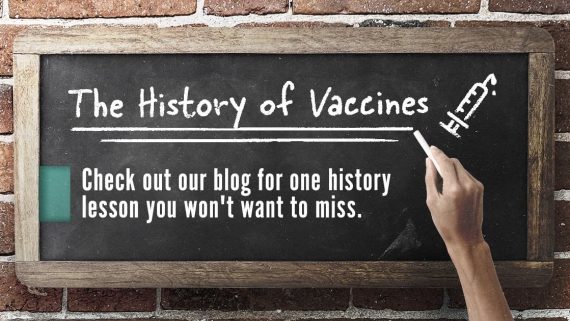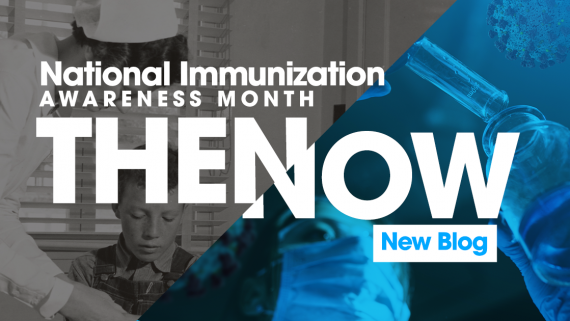The CDC says, “Vaccines are one of the greatest success stories in public health.” Before vaccines, diseases like, measles diphtheria, and whooping cough posed serious threats to the well-being of individuals everywhere. However, thanks to routine immunizations, their devastating effects are preventable. Though the history of vaccines isn’t always cut and dry, their humble beginnings laid the groundwork for saving millions of lives each year.
Early Evidence
When most people think of the birth of the concept of vaccines, they think of Edward Jenner. In the late 1700s, Jenner most notably tested a method that involved taking material from a blister of someone infected with cowpox and inoculating it into another person’s skin. This is referred to as arm-to-arm inoculation.
Surprisingly, evidence exists that the Chinese employed a similar smallpox vaccination method as early as 1000 CE. During this time, Asian physicians gave children dried crusts from the lesions of people suffering from smallpox to protect against the disease. Some children developed immunity, while others developed the disease. The practice was also used in Africa and Turkey before spreading to Europe and the Americas.
200 Years

Over the next 200 years, Jenner’s method underwent medical and technological changes that resulted in the eradication of smallpox. In 1881 Louis Pasteur, a French biologist, evaluated immunization against anthrax by injecting sheep with attenuated forms of the bacillus that causes the disease. Attenuation takes an infectious agent and alters it to become less dangerous. Four short years later, he developed a protective suspension against rabies. By 1980, polio cases declined by 99 percent. Many other vaccines help teach your immune system, how to combat germs and their diseases such as mumps, measles, typhoid fever, cholera, plague, tuberculosis, pneumococcal infection, tetanus, influenza, yellow fever, hepatitis A, hepatitis B, some types of encephalitis, typhus, and more.

Before creating a new vaccine, scientists take several factors into account. For example, they’ll consider who is most vulnerable, what the immune response will be to a germ, and which method is best to use to develop the vaccine. It’s important to note that viral infections do not respond to antibiotics, so vaccines for viruses provide important immune protection.
Join an RSV Study Today!

As more and more prevalent diseases become preventable through vaccines, their impact continues to lessen. ActivMed Practices & Research is seeking healthy volunteers over the age of 60 to join a respiratory syncytial virus (RSV) vaccine study. RSV is a type of respiratory infection that can cause serious illness in older adults. Since there is no vaccine currently available to help protect individuals from the disease, there is a great need for its development. To learn more, click the location nearest you below:
Sources:
https://www.britannica.com/science/vaccine
https://www.historyofvaccines.org/timeline/allhttps://www.chop.edu/centers-programs/vaccine-education-center/vaccine-history/developments-by-year
Every year thousands of individuals become seriously ill and require hospitalization because of diseases that vaccines can help prevent. Many face long-term health complications or succumb to the symptoms of these diseases. Germs are all around us, and protecting our bodies from developing a serious illness goes beyond self-preservation. Vaccines are important. Here’s why.
The Soldiers, the Officers, and the Generals of Immune Response
When a pathogen (virus, bacterium, parasite, or fungus) enters the body, the immune system sends antibodies to fight it off. Whether you get sick or not depends on how effective they are and your immune system’s strength. If sickness occurs, the immune system targets a specific part of the pathogen that shows how to eradicate it. These instructions help to create a type of super antibody specifically trained to kill a pathogen. Lastly, another antibody group is created to remain in the body with the playbook of instructions for any potential future encounters with that particular disease.
Imitation is the Best Form of Flattery
Immunity after infection is tricky because you have to get sick first. When the disease has a high mortality rate or the person has pre-existing conditions that increase the risk for severe infection, gaining immunity naturally is a gamble. Vaccines mimic the body’s natural process by using weakened or inactive parts of the pathogen. Other vaccines only contain the kill instructions and don’t use parts of the virus. Each type is designed to trigger our immune response without having to get sick.

Vaccines Save Lives and so Much More
The ongoing COVID-19 pandemic is a painful reminder of how widespread sickness and loss of life strain the economy, healthcare, national funding, and more. Thanks to clinical research, available vaccines distributed over the last year and a half have made normalcy a reality again.
Bottom line, vaccines are essential because they save lives and:
- Protect us from spreading an illness to our loved ones and others.
- Reduce the likelihood of an outbreak from preventable diseases.
- Help protect individuals who are medically unable or too young to receive immunizations.
- They are very effective in preventing severe disease.
- The safest way to protect your health, so you don’t have to miss work or time with your loved ones.
RSV season is upon us. Respiratory syncytial virus is a common illness that causes cold-like symptoms that can be serious in infants and older adults. ActivMed Practices & Research is looking for individuals to join RSV vaccine studies at our Beverly, MA, Methuen, MA, and Portsmouth, NH locations.

To learn more about how you can get involved in our RSV or other vaccine studies, click here for contact information to your local office and their active studies.
Sources:
https://ftp.historyofvaccines.org/content/articles/top-20-questions-about-vaccination
https://www.cdc.gov/vaccines/adults/reasons-to-vaccinate.html
https://vaccineinformation.org/vaccines-save-lives/
August is National Immunization Awareness Month (NIAM). NIAM’s purpose is to promote the importance of vaccines by educating the public on how they prevent serious, and often deadly diseases. With the COVID-19 US death toll currently sitting at almost 145,000 lives lost, the urgency for a vaccine and effective treatment grow with each passing moment.
History of Vaccines
In 1796, a country doctor by the name of Edward Jenner created the first vaccine. He took the pus from a milkmaid’s hand with a cowpox lesion and inoculated eight-year-old James Phipps, who had smallpox. His experiments laid the foundation for vaccinology. Vaccines are humanity’s greatest triumph over diseases like polio, smallpox, whooping cough, measles, and more. These diseases resulted in infant mortality rates of 20% just a little more than a century ago.
Vaccines help our body remember how to fight illnesses. When your immune system encounters a germ, it fights it off over several days while it makes and uses all the germ-fighting tools it needs to beat it. In this process, the immune system remembers what is necessary to protect the body in the future. It puts this information into memory cells, and the next time it encounters that same germ, it can quickly overcome it. Vaccines work similarly by imitating an infection. They rarely cause illness, but your immune system produces the needed antibodies to fight it. Some vaccines require repeated doses to complete immunity.
The Fight to End COVID-19

Around the world, over 165 vaccines are being developed by researchers against the coronavirus. 27 are in human trials. Although vaccines typically take years to become publicly available, scientists are racing to deliver a safe and effective vaccine by 2021. Moderna’s mRNA-127 vaccine phase III trial began 7/27. Astra Zeneca, Sinopharm, Murdoch Children’s Institute, and Sinovac all have vaccines in phase 3 trials.

None of these potential new vaccines would ever become available without research studies and the volunteers participating in them. Research studies give every able person the ability to advance medicine and help end diseases like COVID-19. Get involved in future studies by calling (603) 319-8863, or click here.
References:
https://www.cdc.gov/vaccines/hcp/conversations/downloads/vacsafe-understand-color-office.pdf
https://www.healthaffairs.org/doi/full/10.1377/hlthaff.24.3.611
https://www.nytimes.com/interactive/2020/science/coronavirus-vaccine-tracker.html
https://www.aap.org/en-us/about-the-aap/aap-press-room/campaigns/immunizations/Pages/default.aspx



